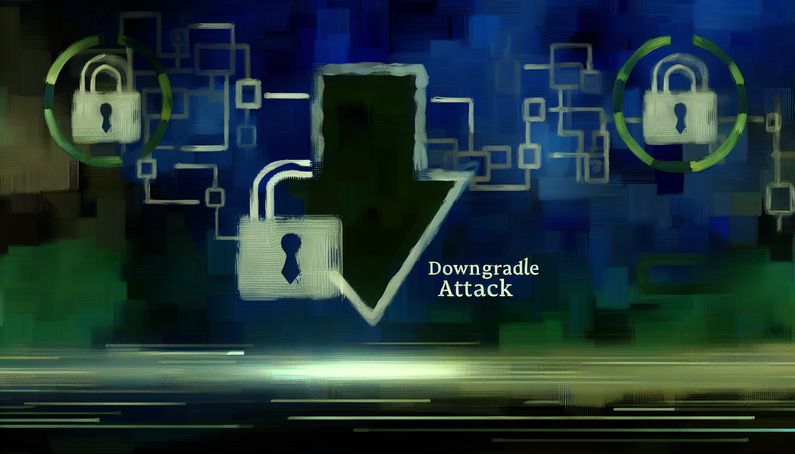
Emerging Downgrade Attack on FIDO Authentication in Microsoft Entra ID
A new downgrade attack has emerged, targeting the FIDO authentication system within Microsoft Entra ID, raising significant concerns in the cybersecurity community. Downgrade attacks exploit the need for backward compatibility in systems, which, while necessary for functionality, can open doors to vulnerabilities. The SentinelOne report highlights that nearly half of organizations still rely on legacy encryption standards, making them susceptible to such attacks. This particular attack, as detailed by Proofpoint, manipulates the FIDO protocol, forcing users to revert to less secure authentication methods, thereby undermining the security FIDO aims to provide. The exploitation of outdated protocols, as reported by COE Security, further illustrates the persistent risks posed by legacy systems, which attackers can leverage to bypass modern security controls.
Previous Research and Related Attacks
Historical Context of Downgrade Attacks
Downgrade attacks have long been a concern in the cybersecurity landscape. They exploit the inherent vulnerabilities in systems that maintain backward compatibility with older protocols. This compatibility is often necessary for functionality and accessibility but poses significant security risks. For instance, a report by SentinelOne highlights that approximately 45% of organizations have comprehensive encryption plans, leaving a significant portion vulnerable to legacy encryption standards. These standards are often seen as low-risk but provide easy entry points for attackers.
Downgrade Attacks on FIDO Authentication
The recent downgrade attack targeting FIDO authentication in Microsoft Entra ID is a sophisticated example of exploiting such vulnerabilities. FIDO, which stands for Fast Identity Online, is designed to provide secure, passwordless authentication. However, researchers from Proofpoint have demonstrated that specific implementations, like Windows Hello for Business, can be susceptible to downgrade attacks. These attacks force users to revert to less secure authentication methods, thereby compromising the security intended by FIDO protocols.
Exploitation of Legacy Protocols
The exploitation of legacy protocols is a recurring theme in cybersecurity breaches. Between March and April 2025, a campaign targeted Microsoft Entra ID by leveraging outdated authentication methods to bypass modern security controls. This campaign, as reported by COE Security, did not involve novel malware but rather the abuse of long-standing protocols that should have been retired. This highlights the persistent risk posed by legacy systems, which attackers can exploit to gain unauthorized access to critical accounts.
Adversary-in-the-Middle (AiTM) Attacks
Adversary-in-the-Middle (AiTM) attacks are a critical component of the downgrade attack strategy. These attacks involve intercepting communications between the user and the authentication system. In the context of FIDO authentication, attackers use tools like Evilginx to capture session cookies and MFA tokens. This technique allows them to hijack accounts that were theoretically phishing-resistant. Although Proofpoint notes that such attacks have not been widely observed in the wild, the potential for targeted attacks remains significant.
User Agent Spoofing Techniques
User agent spoofing is a technique employed in downgrade attacks to bypass FIDO authentication. By spoofing a browser user agent that lacks FIDO support, attackers can trick the system into offering fallback authentication methods. For example, spoofing Safari on Windows, which is incompatible with FIDO-based authentication in Microsoft Entra ID, forces the system to offer less secure login options. This method, detailed by Proofpoint, demonstrates the sophisticated tactics used to exploit compatibility features in modern systems.
Implications for Future Security Measures
The emergence of downgrade attacks against FIDO authentication underscores the need for robust security measures. Organizations must prioritize the retirement of legacy protocols and ensure that their systems are updated to support the latest security standards. Additionally, as highlighted by Wallarm, vigilance in software update processes is crucial to prevent attackers from installing fake updates containing malware. By addressing these vulnerabilities, organizations can better protect themselves against the evolving threat landscape.
Mitigation Strategies for Downgrade Attacks
To mitigate the risks associated with downgrade attacks, organizations should consider several strategies:
- Disable fallback authentication methods: Prevent attackers from exploiting less secure login options.
- Implement additional checks and confirmations: Enhance security during the authentication process.
- Maintain up-to-date systems: Employ robust encryption techniques as essential steps in safeguarding against these attacks.
By adopting these measures, organizations can reduce their vulnerability to downgrade attacks and protect their critical assets.
Final Thoughts
The recent downgrade attack on FIDO authentication within Microsoft Entra ID serves as a stark reminder of the vulnerabilities inherent in maintaining backward compatibility. While these systems are designed to enhance security, they can be undermined by sophisticated attacks that exploit legacy protocols. As Wallarm suggests, organizations must prioritize the retirement of outdated systems and ensure robust security measures are in place to protect against evolving threats. By adopting strategies such as disabling fallback authentication methods and maintaining up-to-date systems, as recommended by SentinelOne, organizations can better safeguard their critical assets against such attacks.
References
- SentinelOne. (n.d.). Downgrade attacks. Retrieved from https://www.sentinelone.com/cybersecurity-101/cybersecurity/downgrade-attacks/
- Proofpoint. (n.d.). Don’t phish me down: FIDO authentication downgrade. Retrieved from https://www.proofpoint.com/us/blog/threat-insight/dont-phish-let-me-down-fido-authentication-downgrade
- COE Security. (n.d.). Legacy authentication: A modern risk for Entra ID. Retrieved from https://coesecurity.com/legacy-auth-modern-risk-entra-id/
- Wallarm. (n.d.). What is a downgrade attack? Retrieved from https://www.wallarm.com/what/downgrade-attack



